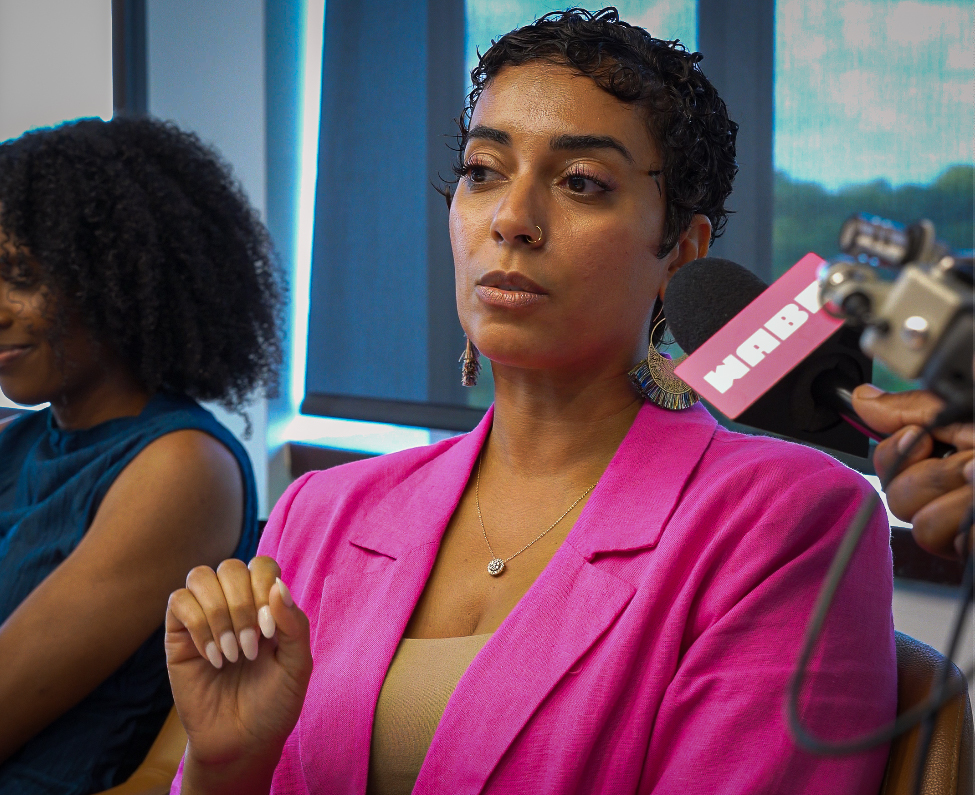Bussiness
Atlanta entrepreneurship hub aims to transform city into a thriving black business mecca

“We have a Tyler Berry and a Holly Berry,” Gaston explains. “The Tyler Berry is our açaí berry smoothie, a hazy Jay-Z, and there’s Cardi Bacardi.”
At LaRayia’s Bodegas some of the drinks on the menu are named after black and brown celebrities. (Marlon Hyde/ WABE)
The metro Atlanta entrepreneur says bodegas are often found in food deserts, communities that lack access to healthy food.
She has dedicated much of her life to bringing quality food to those in need, including feeding the homeless on California’s Skid Row.
When she arrived in Atlanta, Gaston was determined to create her own platform for influencing a healthier lifestyle. Although the rewards have been overflowing, the journey itself was rough.
“It was very hard to get support when people didn’t understand this vision because it hasn’t been done,” Gaston remembers. “So, there was no point of reference. What we did, you can’t find this anywhere.”

Born and raised in Brooklyn, LaRayia Gaston, who is rocking green hair and nails, owns LaRayia’s Bodegas. Gaston built this place as a platform for influencing a healthier lifestyle, and it was rough. (Marlon Hyde/WABE)
This is a very common experience for Black-owned businesses throughout Atlanta. According to a 2023 small business report, predominantly Black neighborhoods within the city receive lower business loan amounts than other neighborhoods.
In the same report, researchers found that only 20% of Black business owners are approved for loans, lines of credit and cash advances nationally, compared to 33% or more for all other racial-ethnic groups.
Scaling Up
When Gaston first began searching for resources to help her business grow, she discovered the Russell Innovation Center for Entrepreneurs. Also known as RICE, the organization assists in supporting local startups “scale up” by providing the growing businesses mentorship and a place to work.
“In Atlanta, 96% of Black businesses only have one employee. In the Russell Center, over 70% of ours have employees,” said Jay Bailey, the center’s CEO.
Since opening in 2020, RICE has supported almost 500 entrepreneurs who have created jobs and added value to our economy.
“I think it’s probably one of the greatest investments the city could make if we started investing in the power of ideas and the systems and the institutions that help those ideas come to life,” said Bailey, whose sitting at a table that contains a scale model of Atlanta divided by I-20.

A table that contains a scale model of Atlanta divided by I-20. (Matthew Pearson/WABE)
“If you look closer at the table, you will see that the triangle in our logo is positioned on that table. And it’s a reminder of to us consistently how we sit at the nexus of access, opportunity, and exposure for our community,” said Bailey.
He says the goal is not to beat the odds but to redefine them completely. The mission was started by the person the center is named after, Herman J. Russell, an Atlanta entrepreneur, civic leader, and philanthropist.
According to the U.S. Department of Commerce, H.J. Russell & Company is the country’s largest minority-owned real estate and construction company.
Russell helped build the Atlanta we know today, with some of his projects including landmarks like the Hartsfield-Jackson Atlanta International Airport, the Georgia Dome, Philips Arena (later State Farm Arena) and Turner Field.
From the co-working spaces to conference rooms to murals to the stairways, every inch of The Russell Center is meant to inspire business owners to keep building on their dreams.

The Russell Innovation Center for Entrepreneurs – RICE supports Black owned businesses startup and scale up in Atlanta. This mural contains nods to Atlanta’s rich entrepreneurial history including the HJ Russell family who the building is named after. (Matthew Pearson/WABE)
Bailey says there is a long waitlist for people trying to get a spot at RICE, and more support should be opened citywide.
The city of Atlanta has opened grants and funds for Black entrepreneurs, but it’s not enough. Minority businesses still see stark disparities in business loans, government contracts and overreliance on credit.
“The institution carries enough wait for me to find joy,” Bailey added. “So as I look around the center to see how far we’ve come thus far, I can’t wait to [see] 20 years in the future if we really did it the right way.”

RICE says the building is intentionally filled with words and images meant to inspire entrepreneurs to think in innovative and collaborative ways. (Matthew Pearson/WABE)
Opening Doors
“Our entrepreneurs are no slouches,” Bailey said.
According to the Atlanta Regional Commission, he says, “they sustain over 2700 jobs in the metro Atlanta area, contribute over $180 million of annual revenue to the city of Atlanta.”
For $100 a month, RICE entrepreneurs, also known as stakeholders, have access to a workspace, coaching and a network of Black entrepreneurs, among other resources.
“Being here at Rice confirms that you’re not alone,” said Jennifer Barbosa, founder of International Supply Partners, LLC, a minority woman-owned wholesale supply and equipment company.
“You have an opportunity to collaborate and exchange ideas with other entrepreneurs. You have people who understand the challenges and the experiences that are unique to being a black person and also obviously the resources.”

Jennifer Barbosa runs International Supply Partners, LLC, a Minority Woman-Owned wholesale supply and equipment company. (Matthew Pearson/WABE)
RICE says its impact statement is centered around revenue growth and job growth.
“We’ve seen 56% of our business owners achieve year-over-year revenue growth. And when you compare that with some of the other data on black businesses outside of RICE, that’s a substantial impact, especially over these most recent years where we’ve seen kind of a downturn coming out of the pandemic,” said Malcolm Muhammad, VP of data and research at RICE.
One example of successful business owners being able to see their businesses grow while being apart of the organization is Kenneth Duncan, CEO of Renegade Golf.
The Black-owned golf balls and bags company operates with the mission to make golf more inclusive and affordable.
“Our company, in a lot of ways, I feel like is a welcoming hand for women during the game, for younger millennials, during the game, and for minorities who haven’t seen themselves in that space outside of maybe Tiger Woods,” said Duncan, who joined RICE last year. “I think that the Russell Center is a good reflection of that.”

Kenneth Duncan, CEO of Renegade Golf, a Black-owned golf balls and bags company with the mission to make golf more inclusive and affordable. (Matthew Pearson/WABE)
Re-imagining Funding
According to the U.S. Chamber of Commerce, nearly 71% of Black entrepreneurs depend on personal and family savings for financing.
“It’s unfortunate, but that’s where we are, right?” said Tiffany Bussey, the executive director of the Morehouse Innovation and Entrepreneurship Center.
She believes it’s time to disrupt how Black and brown business owners interact with the banking industry, even suggesting that the entrepreneurs try something inspired by her Caribbean roots.
“Susu is where you get together in a small group, and everybody puts in $25 or $100, and then you draw and take turns,” said Bussey. “We need to go back to perhaps a more higher level of Susu for crowdfunding and businesses.”
Institutions like RICE are set to expand in the coming years. And many are delighted to see such a fountain of Black innovation developing in Atlanta, as policies and the upcoming presidency could reshape the future.
“I cannot overemphasize how important this election is,” said Busey. “We are already at a critical point where we need to have the policies and procedures in place. And it is clear who supports our best interests. We have to vote in line with our best interests for inclusivity and an inclusive economy.”








